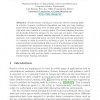Free Online Productivity Tools
i2Speak
i2Symbol
i2OCR
iTex2Img
iWeb2Print
iWeb2Shot
i2Type
iPdf2Split
iPdf2Merge
i2Bopomofo
i2Arabic
i2Style
i2Image
i2PDF
iLatex2Rtf
Sci2ools
IBERAMIA
2010
Springer
2010
Springer
Dynamic Reward Shaping: Training a Robot by Voice
Reinforcement Learning is commonly used for learning tasks in robotics, however, traditional algorithms can take very long training times. Reward shaping has been recently used to provide domain knowledge with extra rewards to converge faster. The reward shaping functions are normally defined in advance by the user and are static. This paper introduces a dynamic reward shaping approach, in which these extra rewards are not consistently given, can vary with time and may sometimes be contrary to what is needed for achieving a goal. In the experiments, a user provides verbal feedback while a robot is performing a task which is translated into additional rewards. It is shown that we can still guarantee convergence as long as most of the shaping rewards given per state are consistent with the goals and that even with fairly noisy interaction the system can still produce faster convergence times than traditional reinforcement learning techniques.
Artificial Intelligence | Extra Rewards | IBERAMIA 2010 | Long Training Times | Reward Shaping Approach |
| Added | 25 Jan 2011 |
| Updated | 25 Jan 2011 |
| Type | Journal |
| Year | 2010 |
| Where | IBERAMIA |
| Authors | Ana C. Tenorio-Gonzalez, Eduardo F. Morales, Luis Villaseñor Pineda |
Comments (0)

